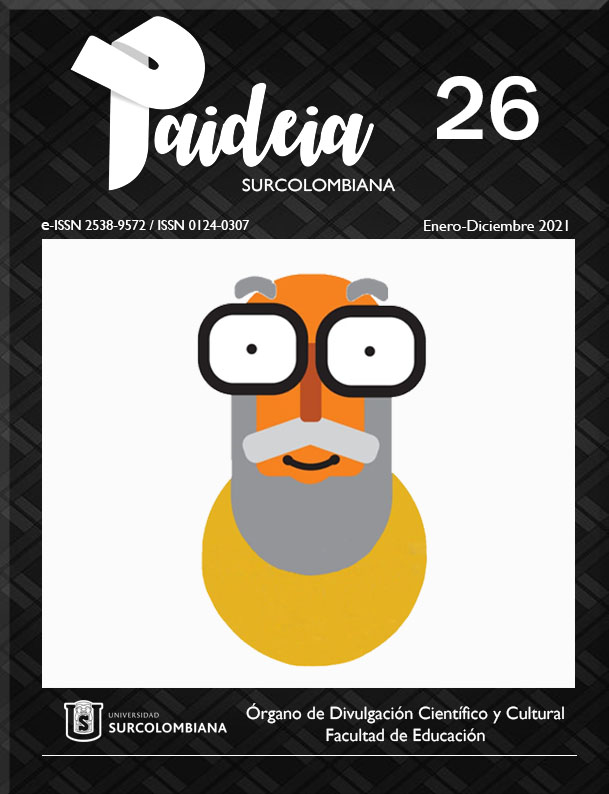The role of Young people in alternative citizenships: a commitment to build environmental awareness in Colombian sociocultural contexts
##plugins.themes.bootstrap3.article.main##
The objective of this research article was to identify how Colombian youths belong to diverse socio-cultural contexts in the Caribbean and Andean regions. The research participants recognize the major environmental issues and recognize themselves as actors in making decisions regarding the environmental dimension. It is approached from the meaning and dynamics of alternative citizenship exercised among youngsters from the environmental dimension, and participation in decision-making in their territories, through activism in training spaces or dialogue of knowledge. The methodology is mixed supported by focal groups that count with the participation of 32 youngsters between 15 and 25 years of age, high school, and higher education students. The results are presented based on the analysis of environmental perceptions among young people and the recognition of the population's actions as political agents in decision-making. In this way, the leading role assumed by young people is visualized, being interested in recognizing and appropriating the biophysical, social, and political elements within their territories so that they become transforming agents through action and participation.
Downloads
##plugins.themes.bootstrap3.article.details##
Andrade G. I., M. E. C. G. C. y C. T. (2018). Transiciones socioecológicas hacia la sostenibilidad. Gestión de la biodiversidad en los procesos de cambio en el territorio continental colombiano. Primera aproximación (M. E. C. G. C. y C. T. Andrade G. I., Ed.; IAvH).
Araujo. F. (2016). Los nuevos movimientos sociales y las ciudadanías emergentes. Estudios socio-jurídicos, 43-69. http://dx.doi.org/10.12804/revistas.urosario.edu.co/sociojuridicos/a.4025.
Gligo, N., Alonso, G., Barkin, D., Brailovsky, A., Brzovic, F., Carrizosa, J., ... y Villamil, J. J. (2020). La tragedia ambiental de América Latina y el Caribe. CEPAL.
Delfino, Gisela I, y Zubieta, Elena M. (2010). Participación política: concepto y modalidades. Anuario de Investigaciones, XVII, 211-220. [Fecha de Consulta: 17 de junio de 2021]. ISSN: 0329-5885. Disponible en: https://www.redalyc.org/articulo.oa?id=369139946011
Diario Oficial. (2012, Julio 5). Ley 1549 DE 2012. Diario Oficial. Sistema Único de Información Normativa. Colombia, 6.
He, X. (2020). The role of social trust in public participation in environmental governance: Empirical evidence from households in China. Resources and Environmental Economics, 2(2). https://doi.org/10.25082/REE.2020.02.005
Hernández Sampieri, R. (2018). Metodología de la investigación: las rutas cuantitativa, cualitativa y mixta. McGraw Hill.
Ministerio de Educación Nacional, Ministerio de Ambiente. (2002). Política Nacional de Educación Ambiental. Bogotá: Ministerio de Educación Nacional.
MADS. (2020, Julio 23). Respuesta derecha de petición SEP 8111-2-465.
Ortiz, W. (2010). Ciudadanías alternativas. Una propuesta para el debate político actual. Revista Ratio juris, vol 5 No 11 (julio-diciembre 2010) pp. 69-101. https://doi.org/10.24142/raju.v5n11a3
Mora, L. V. (2013). Dimensión ambiental, desarrollo sostenible y sostenibilidad ambiental del desarrollo. In Eleventh LACCEI Latin American and Caribbean Conference for Engineering and Technology (LACCEI’2013) “Innovation in Engineering, Technology and Education for Competitiveness and Prosperity” August (pp. 14-16).
Román, A., Plazas, D y otros (2018). Construcción de ciudadanías alternativas: apuestas y retos incluyentes en el escenario sociopolítico contemporáneo. Editado por Luisa Fernanda Muñoz Rodríguez. Universidad Manuela Beltrán, Bogotá.
Schaaf, A. A., Alcalde, S., Rivera, L., y Politi, N. (2018). Conocimiento de estudiantes primarios sobre el bosque y la biodiversidad de las Yungas Australes en la ciudad de San Salvador de Jujuy, Argentina. Ecología Austral, 28(3), 565–571. https://doi.org/10.25260/EA.18.28.3.0.742
Silva, N., Cristancho, L. y otros (2015). Ciudadanía juvenil: Una breve revisión. Revista Universitas-Perspectivas en Psicología. Vol 11, No 2.
Strieder Philippsen, J., Soares Angeoletto, F. H., y Santana, R. G. (2017). El nivel de educación y los ingresos son importantes para la buena conciencia ambiental: un estudio de caso desde el sur de Brasil. Ecología Austral, 27(1). https://doi.org/10.25260/EA.17.27.1.0.300
Vives, J. (2012) El ciudadano ecológico: Reflexiones sobre algunos contextos sociales y elementos cosmovisionales. Sociología y Tecnociencia. Revista digital de sociología del sistema tecnocientífico.





 Perfil Google Scholar
Perfil Google Scholar









